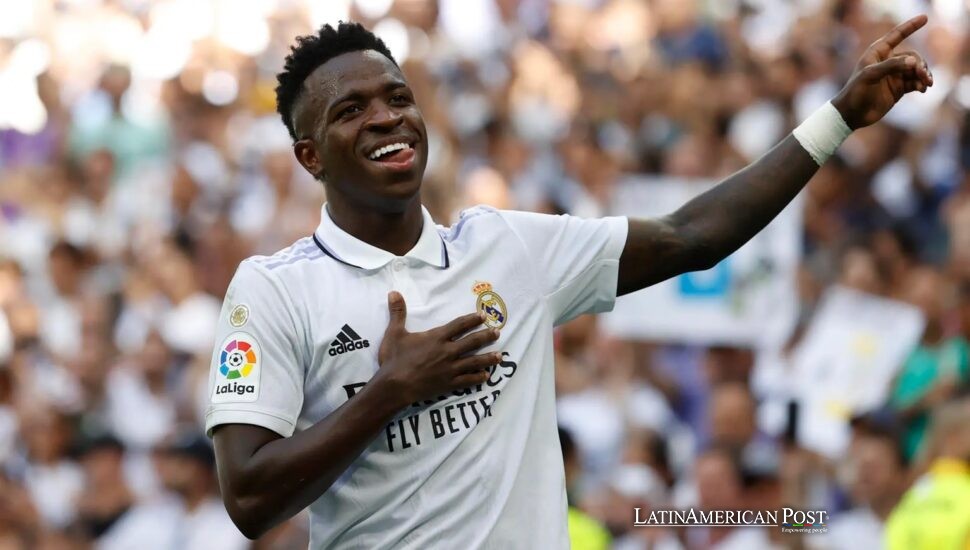Brazilian Star Vinicius Jr. Upholds Justice In Stadium Racism Battle

Vinicius Jr., Real Madrid’s top Brazilian player, took a firm stand for justice as he spoke about racist remarks in a Barcelona court. He remains determined to make guilty people face consequences and draws attention to Spain’s widespread issue of bias in football.
Vinicius Jr. Seeks Accountability in Court
The tension was palpable as Vinicius Jr. sat before a camera in Madrid, connecting by video to a Barcelona courtroom where a judge was investigating hate speech allegations. A 23-year-old phenom with global recognition, the Brazilian forward confronted an ugly reality that transcends sporting rivalries. His statement ‒ a few careful words about the abuse he faced ‒ made an impact in Spain as well as many other countries. The testimony took just minutes, but Vinicius showed his commitment to pursue legal actions against those who directed racial slurs at him at the Montjuïc stadium in October 2023.
That was the day Real Madrid clashed with FC Barcelona in a marquee encounter known as “El Clásico.” But for Vinicius, the match came to symbolize more than athletic rivalry. Even as he dribbled and sprinted across the pitch, a segment of the Barcelona crowd allegedly erupted in vile chants. Camera footage and a witness account singled out at least two individuals—apparently part of a larger group—who launched hateful epithets at the Real Madrid winger. Investigators soon identified these culprits, and local authorities opened a case under Spain’s hate crime statutes. Vinicius, as the primary victim, could have decided to drop the matter to avoid the slog of legal proceedings. Instead, he doubled down, letting the court know he intended to see this case through.
He gave his testimony with composure. Gone was the flashy style that people saw on the field. A solemn mood surrounded him as he defended every Black player who stepped on a European pitch plus faced slurs from fans. His words clarified that the legal process meant more than a formality – a duty he felt he must pursue. He wanted to classify these incidents as real hate crimes: not just misconduct but actual racial assaults that need prosecution.
The hearing adds another part to a story that follows Vinicius’s career. Even as one of soccer’s most talented players, his name often appears in news feeds following unsettling stories about racism. In Spain, separate investigations have targeted fans of other clubs—Valencia, Atlético Madrid, and beyond—who have directed racial taunts his way. The Montjuïc confrontation fits neatly into a bigger puzzle: a sustained pattern of abuse that casts a dark shadow on Spanish football’s storied legacy.
Vinicius’s critics sometimes accuse him of courting controversy on the field—celebrating goals with flamboyant dances and showing a self-assured attitude. But defenders of the Brazilian argue that none of that should justify or excuse racist taunts. In a climate where top athletes often claim they try to ignore hostility from the stands, Vinicius stands out for breaking that silence. By taking the matter to court, he hopes to dismantle the notion that racism can be overlooked in favor of “focus on the game” or the misguided logic that offensive chants are typical banter.
Chronology of an Ongoing Struggle
This case began on a sunny weekend in October 2023, when El Clásico was relocated to Montjuïc amid renovations at FC Barcelona’s usual stadium. The match started with potential drama on the field but shifted to troubling events in the seats after two quarters. As security personnel checked video recordings, a group was spotted who shouted racial insults at Real Madrid’s winger. The reports indicate three main suspects led these insults, plus one turned out to be underage – who must now face charges in juvenile court. Police caught two adult suspects as the primary instigators who protested against any racist accusations.
However, despite their objections, Barcelona’s hate crimes unit found the reports quite serious and decided to act. The judge overseeing the case invited multiple parties to step forward, including the public prosecutor specializing in hate crimes, La Liga officials, Real Madrid, and Vinicius himself. The victim’s explicit desire to press charges is critical for the legal process to move forward under Spain’s structure. Vinicius told the court he wished for both investigation and prosecution to continue.
A similar pattern exists across Spain, where multiple cases link to racist slurs against Vinicius. In May 2023, a severe incident occurred at Valencia’s Mestalla stadium. The video revealed a crowd who shouted racial insults. Those found guilty later received an eight-month prison sentence for a crime classified under Spain’s “offenses against moral integrity,” aggravated by hate elements. That conviction stands as a stark message that racist behavior in stadiums can indeed bring legal consequences.
A more disturbing incident occurred in January 2023 when four people suspended an effigy of Vinicius from a bridge close to Real Madrid’s training facility. The doll wore the player’s jersey plus hung from a noose – a truly despicable act that sparked widespread outrage. The Spanish police swiftly found as well as charged the suspects with hate crimes. Such events reveal a troubling trend but also demonstrate progress in Spain’s legal approach: investigators plus judges now treat football racism as a serious crime rather than just rowdy fan behavior.
Over the past few years, police have seldom acted against these cases and often labeled them as rash misbehavior. However, the reaction has shifted because of public demands and the backing of groups like Kick It Out and Show Racism the Red Card. The authorities now grasp that racial abuse exceeds simple insults – it stands as a direct assault on human dignity.
For Vinicius, each new legal confrontation expands the broader conversation about how football leagues, clubs, and fans should respond to racism. Real Madrid has thrown institutional weight behind him, sometimes co-filing complaints. La Liga president Javier Tebas vows to ramp up all anti-racism measures despite his first mistakes when he dealt with the Vinicius case. A club like Barcelona now faces two sides of the issue: they must speak against racism and prepare for legal action when their own fans step over boundaries.
Legal Precedents and Ongoing Cases
The Montjuïc hearing arrives at a time when Spain’s judicial system is building a track record of addressing racist incidents inside stadiums. Vinicius’s role in these court cases shows that people no longer accept hateful chants. Many observers see this as a step toward better inclusion. But experts say real improvements need courts to hand out penalties, and clubs must adopt strict policies.
The verdict against Valencia fans who insulted Vinicius in 2023 stands out. The courts charged these people with offenses against moral integrity and gave them stadium bans lasting between one and five years. Spanish officials wanted to make it very clear: racist behavior leads to actual punishment. That verdict resonated beyond Valencia, emboldening prosecutors in other regions to press ahead with cases once considered borderline.
FC Barcelona supporters now under investigation for the Montjuïc incident maintain their innocence. Their attorneys have argued that the images captured in the stadium are inconclusive, insisting that the chants were typical banter, not hate speech. Meanwhile, the local public prosecutor—and the judge who opened formal inquiries—see enough credible evidence of racist abuse to proceed. Vinicius’s firm stand to pursue the case stops any attempts to dismiss it as a simple misunderstanding.
The presence of Spain’s hate crime units serves as a key factor. These offices exist in specific regions and actively seek bias-motivated crimes, including racism at sports venues. The Barcelona prosecutor’s office has really led the way with legal action against discrimination. It also backed the Iñaki Williams case after the Athletic Club forward faced racist abuse in a 2020 match. That case still waits for resolution but has proven the office’s dedication to fighting bigotry.
A clear link connects Vinicius’s battle to these developments. Indeed, the synergy among multiple parties—La Liga, the clubs, the Spanish judiciary, specialized prosecutors, and a vocal victim determined to press charges—reflects an emerging framework. Football remains a beloved national pastime, but an invisible line has been drawn: fervent support is welcome; hate speech and racist intimidation are not.
A Wider Battle: The Future of Inclusivity in Football
With each new alleged racism incident in the news headlines, people ask: Does sport mirror deep social issues, or does it just exist in stadiums? Vinicius, who grew up in Brazil plus became a teen star before his move to European football, hits close to home. A reality remains that racial problems exist not just in Spain but also in football. But the stadium’s special setup – where fans blend into crowds, which brings out awful behavior – turns into a hotbed for bias.
Vinicius has decided to use his influence to fight hate. Though still early in his career, he has grown more vocal about demanding accountability, whether that means legal action or calling on officials to halt matches when fans engage in racist chants. Some of Spain’s top players, including those from rival clubs, have thrown public support behind Vinicius. The message rings clear: racism hurts the entire league plus the person it targets.
Real Madrid fully backs its young star. Players and board members state that no competitor should face discrimination on Spanish soil—no matter their skill or fame. The clubs now face a fundamental shift, where teams must tackle racism directly instead of quietly handling it. A clear need exists for fast action, improved security, anti-racism campaigns, and quick responses.
Spanish media wants stricter rules. The experts discuss partial stadium closures, match stoppings, or higher fines as possible solutions to prevent future incidents. Many look at different European leagues with firm policies. Italy faced racist behavior for years, which resulted in empty stadiums after fan misconduct. England changed its methods and handed out lifetime bans for the worst offenders.
The affected people see these discussions as a step forward. However, some feel skeptical that statements, reactions, and meetings might disappear once media attention moves elsewhere. They point to moments when significant attention was fixed on bigotry in the past—only for the conversation to cool after a few months, leaving behind little structural change. Vinicius’s push for justice aims to break that cycle. By insisting on his day in court, he demands that fans who spout racist slurs face legal scrutiny. The fact that multiple convictions have already come through in other regions signals that demands for accountability are not empty.
Going forward, the objective measure of success lies beyond any single trial outcome. If Vinicius’s dedication to the cause helps usher in a cultural shift—spurring Spanish football associations, top-tier clubs, and law enforcement to consistently stamp out racism—then his sacrifice and stress will have served a higher purpose. In a hyper-connected world, 21st-century fan culture can pivot rapidly. Word spreads fast, plus if fans notice their hostile taunts lead to direct consequences, they’ll probably pause before they shout slurs.
The battle of Vinicius shows what matters in today’s sports. Athletes—who once had to “play and shut up”—now speak up against unfairness. This mix of sports and social duty happens in front of millions. What takes place in Barcelona, as well as similar incidents in Valencia and Madrid, might set fresh rules for how European leagues deal with racism. This could affect other sports, too.
A lot of people watch as Barcelona’s legal process moves ahead. Investigations will conclude, the judge will weigh the evidence, and a ruling could follow if the evidence supports the charges. Meanwhile, Vinicius dazzles on the pitch, scoring goals and thrilling fans. Yet behind every triumphant celebration, there’s a reminder of the times he’s had to pause, look toward the stands, and register words hurled at him with the intent to degrade. The text stands as testimony plus presses charges, which turns his pain and anger from racism into a firm demand for justice.
Also Read: Mexico’s Rise in Boxing’s Heaviest Divisions
A fight extends far past Vinicius Jr. or Real Madrid. It really challenges Spanish society and urges all lawmakers, sports officials, and fans to face the racism that flows into stadium chants. If Vinicius succeeds, it’ll set an important standard: stadium seats don’t protect fans who use hate speech. The Brazilian star’s decision to speak out builds toward a positive future of a more open game where fans cheer for skills and teamwork next to the pure magic of football.





